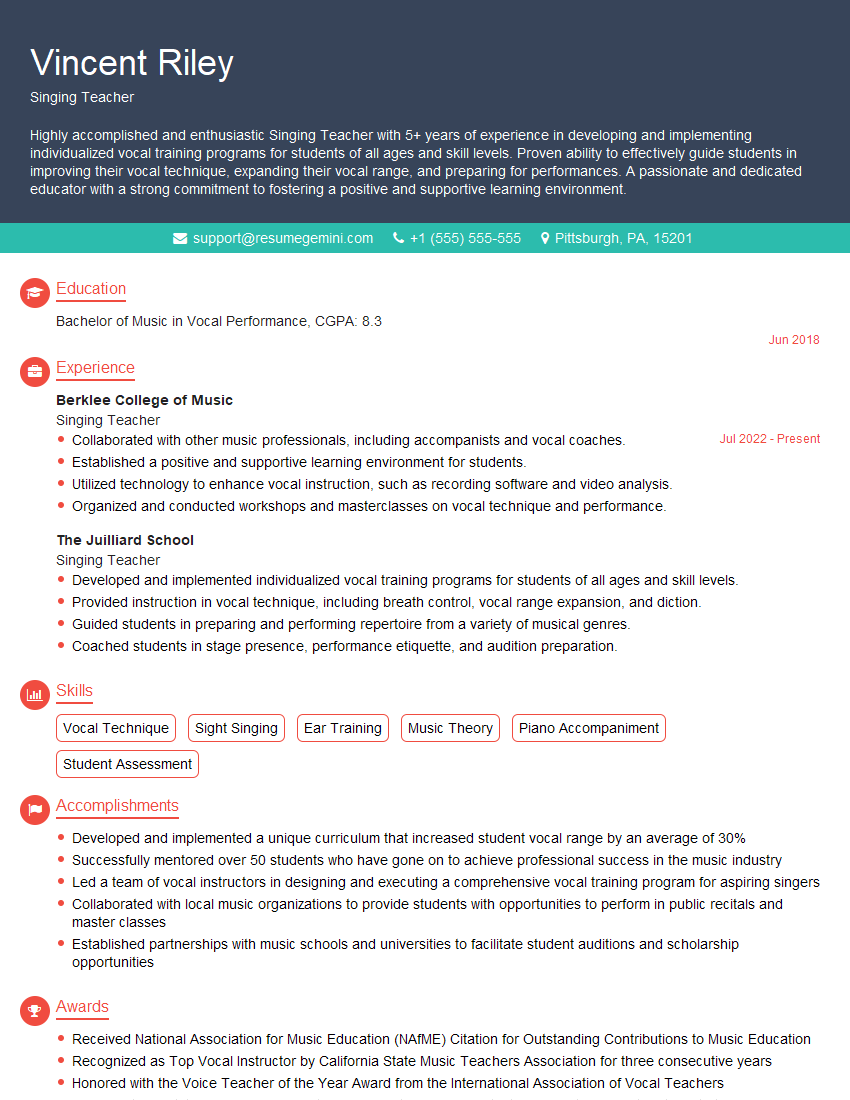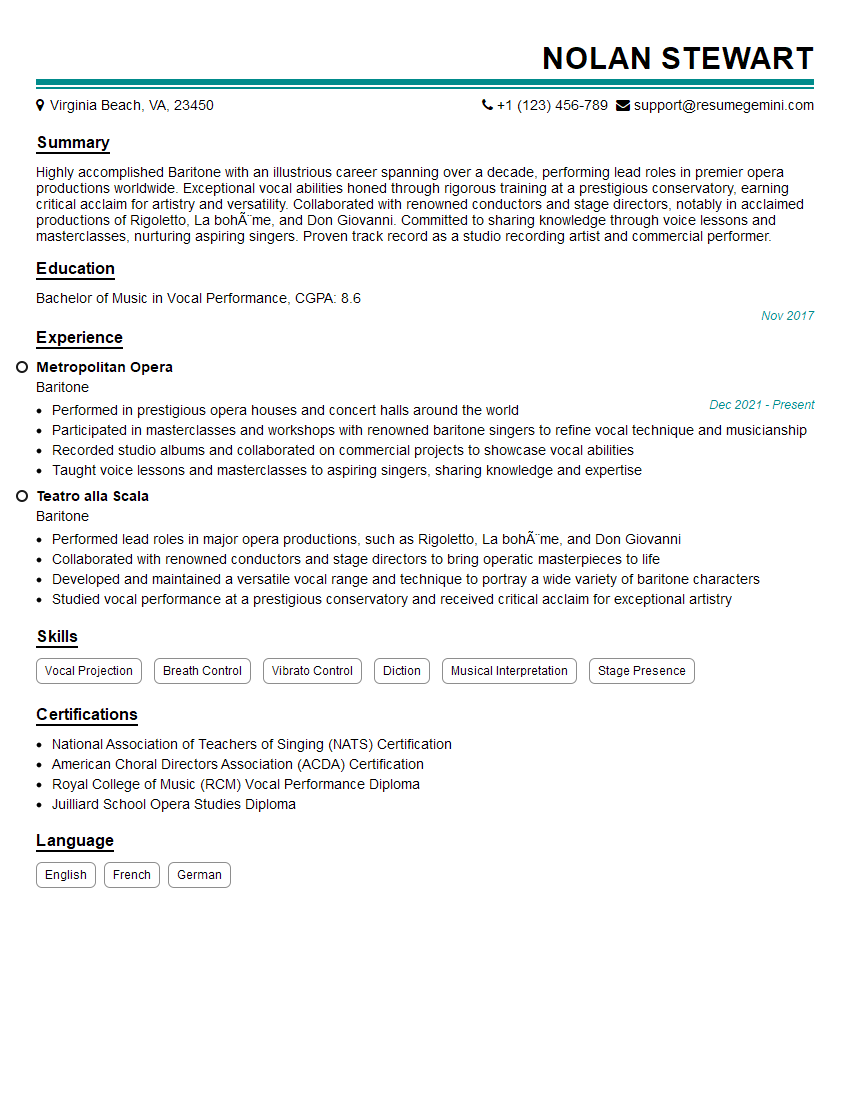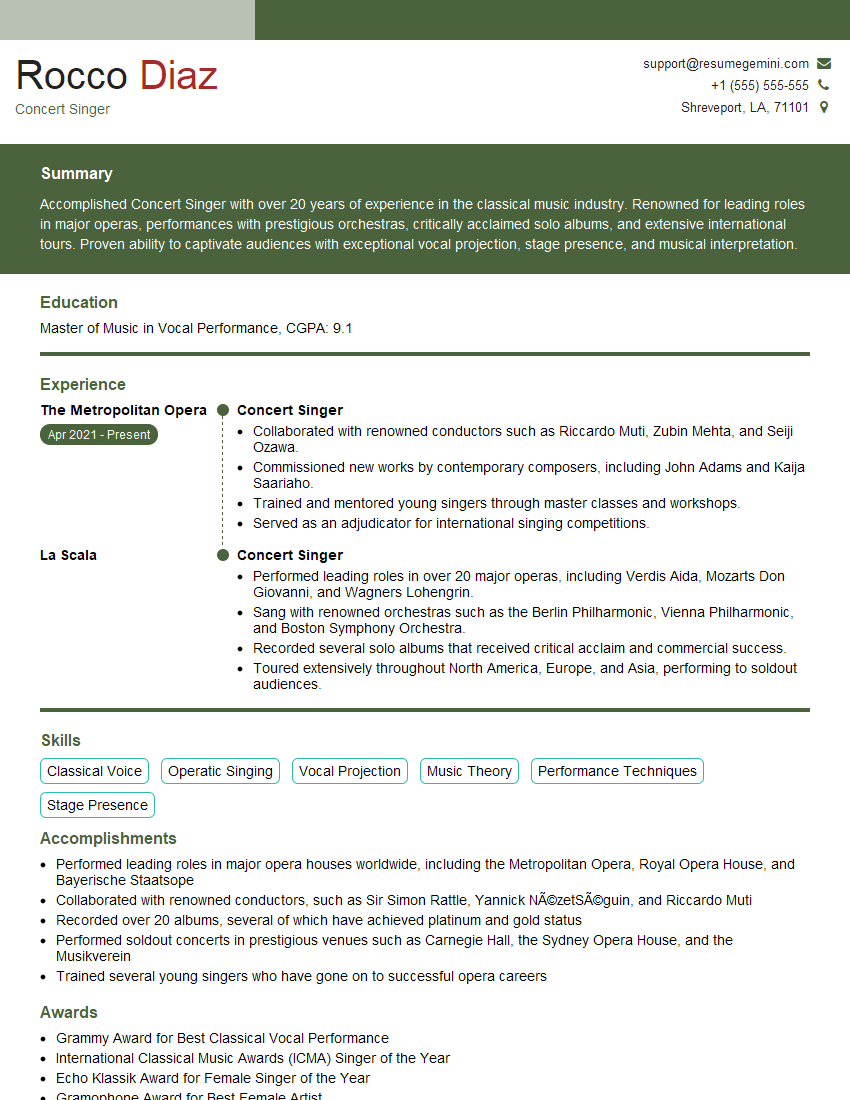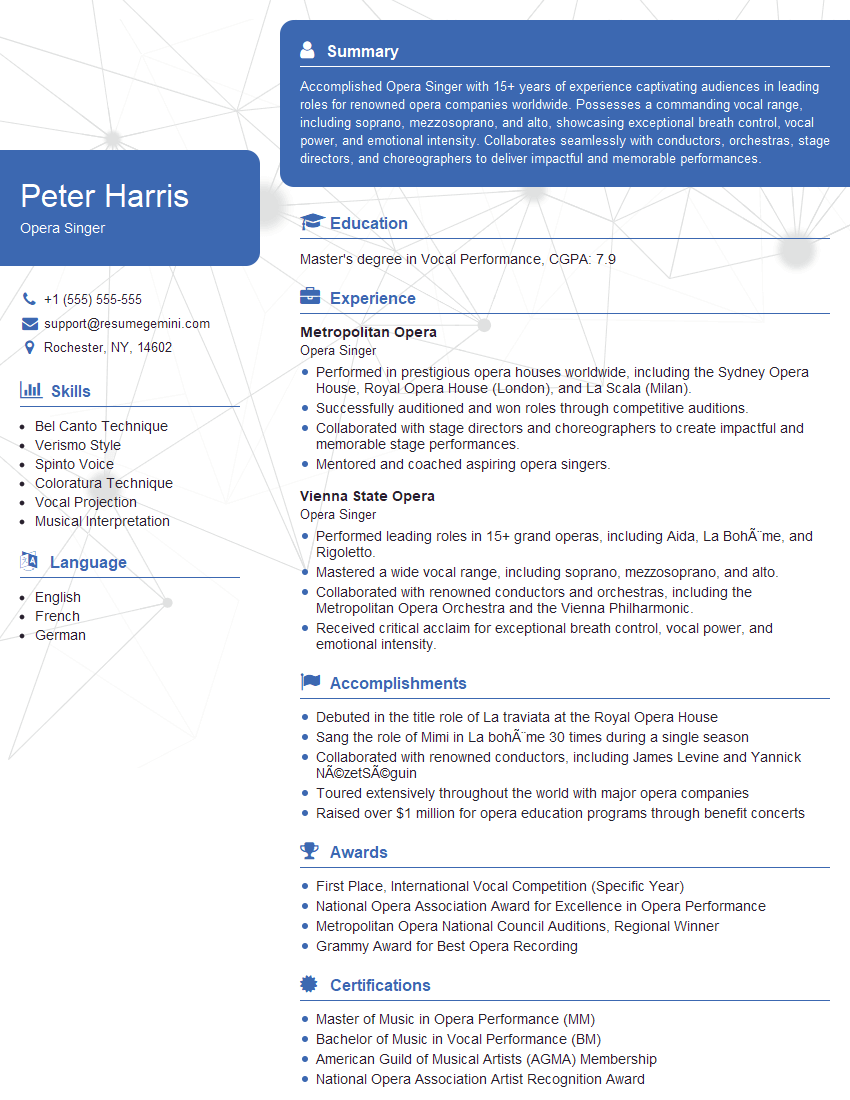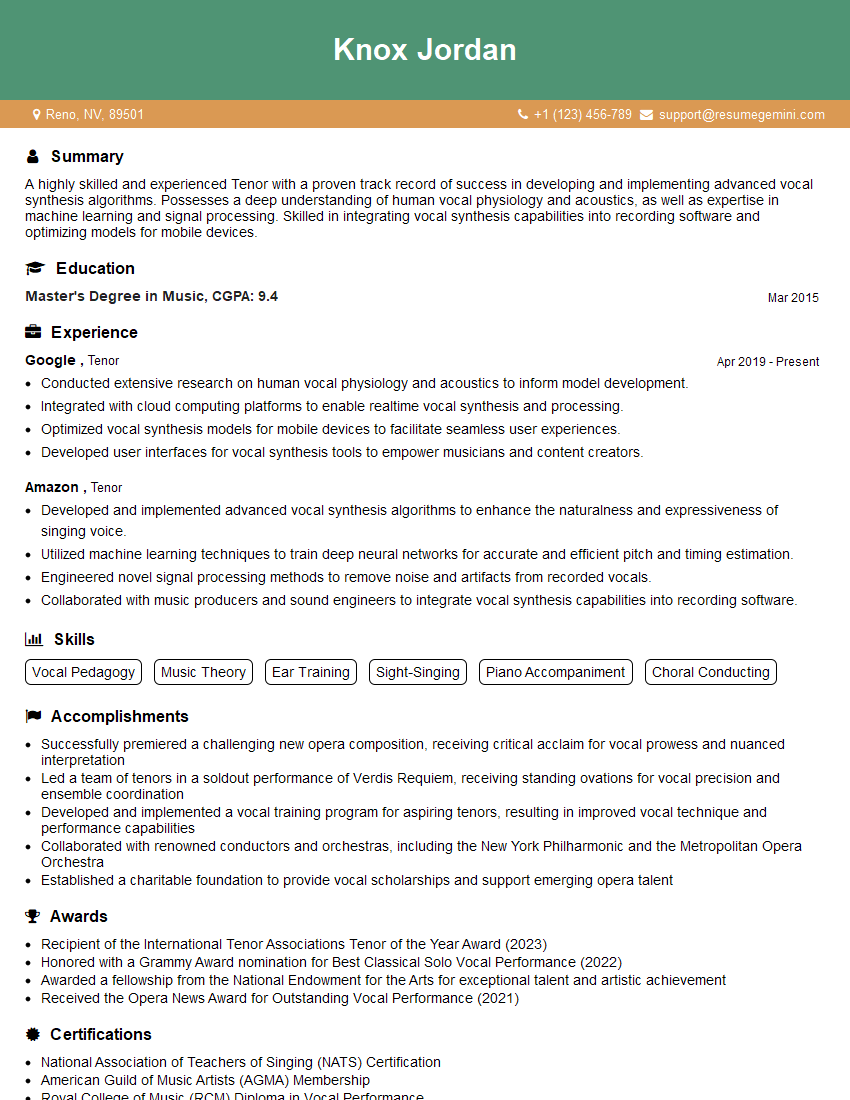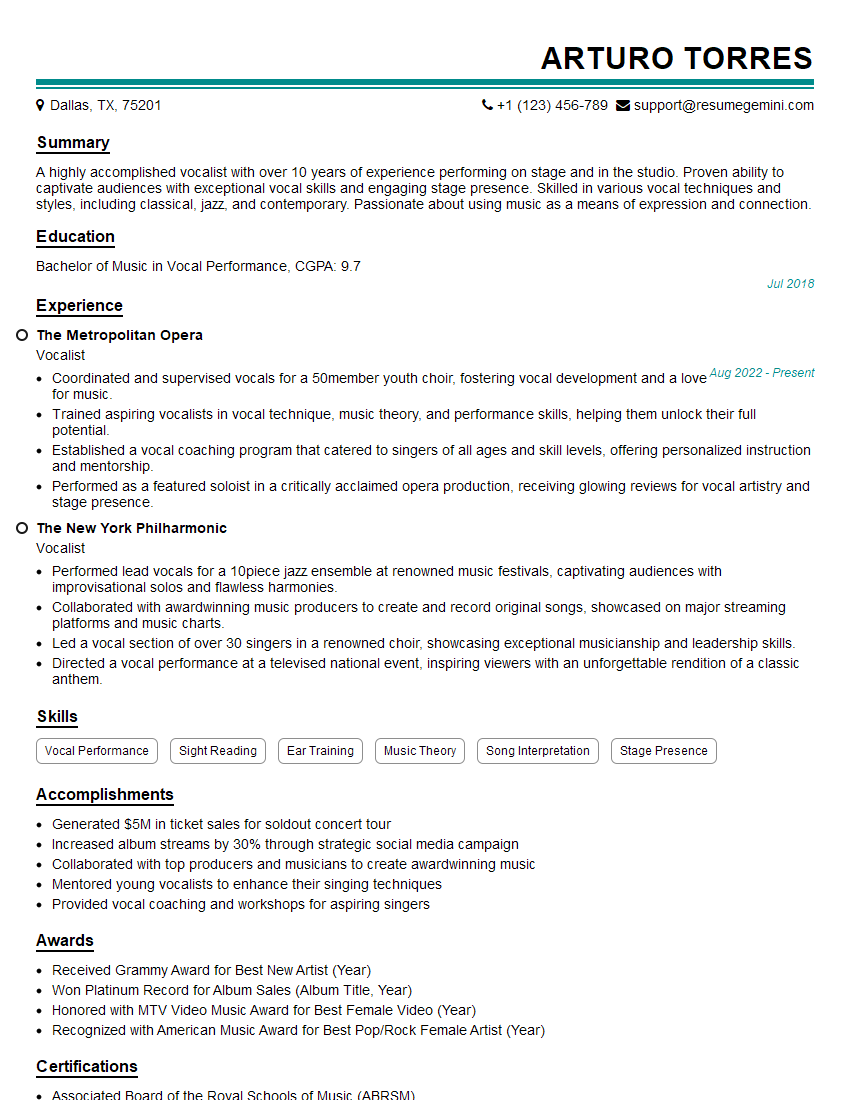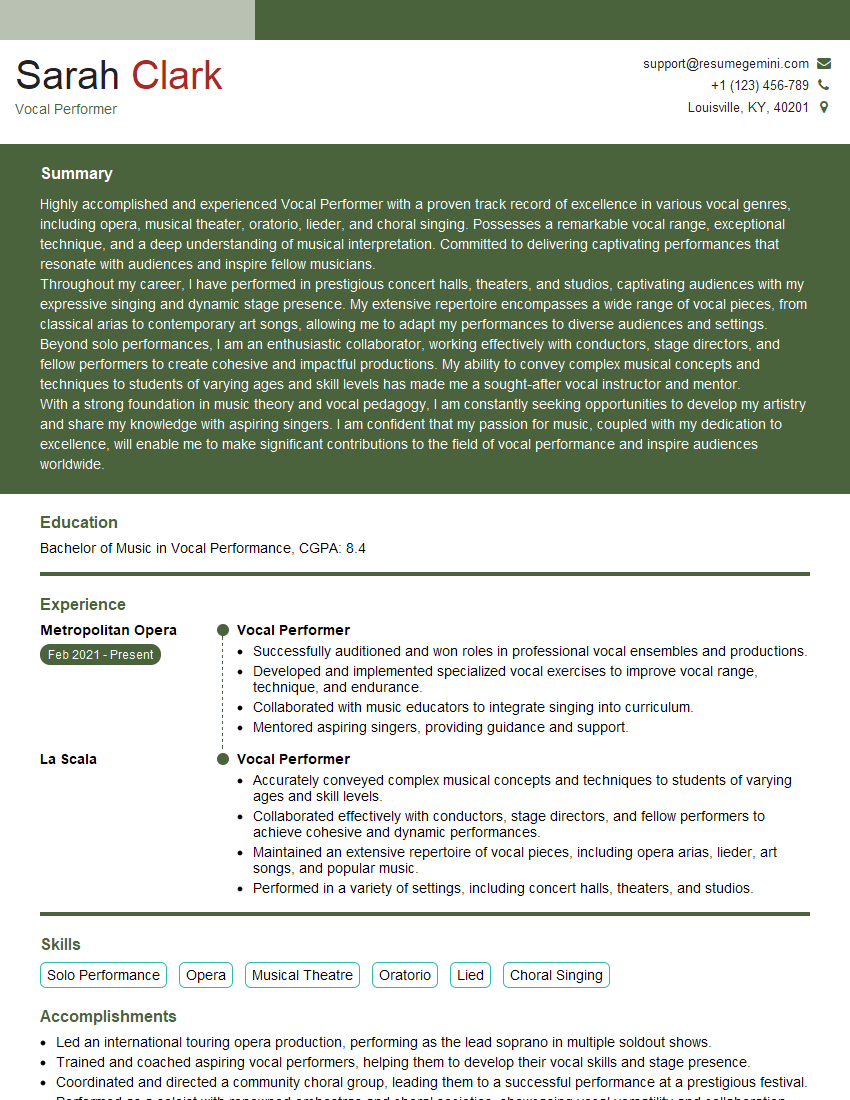Are you ready to stand out in your next interview? Understanding and preparing for Solo Singing interview questions is a game-changer. In this blog, we’ve compiled key questions and expert advice to help you showcase your skills with confidence and precision. Let’s get started on your journey to acing the interview.
Questions Asked in Solo Singing Interview
Q 1. Describe your vocal range and tessitura.
My vocal range comfortably spans from a low A2 to a high C6, though my tessitura – the most comfortable and efficient part of my range – lies primarily between D3 and A5. This means while I can technically reach notes outside this area, consistent and resonant tone quality is optimal within that D3-A5 range. Think of it like a painter having a wide array of colors but preferring to work primarily within a certain palette for optimal effect. My tessitura is where my voice feels most natural and powerful, allowing for nuanced expression and effortless projection.
Q 2. What vocal techniques do you utilize for breath control?
Breath control is fundamental to singing. I utilize a combination of techniques. Firstly, diaphragmatic breathing is crucial – I engage my diaphragm, expanding my abdomen and lower back on the inhale, rather than just raising my chest. Think of it like filling a balloon from the bottom up. This provides a steady, supported airflow. Secondly, I practice breath management exercises such as sustained vowel sounds and controlled legato phrasing to build endurance and stamina. Finally, I incorporate visualization techniques, picturing the flow of breath like a smooth river, consistently powering my vocal production.
Q 3. Explain your approach to interpreting musical phrasing and dynamics.
Interpreting musical phrasing and dynamics is about conveying the emotion and narrative within a piece. My approach involves carefully studying the score, identifying the composer’s intended arc and emotional trajectory. I focus on shaping phrases through phrasing, using crescendos and diminuendos not only to enhance the melody but to reflect the emotional weight of the text or the story being told. For instance, a crescendo on a line describing mounting tension creates a palpable effect for the audience. I pay close attention to articulation, ensuring precise consonants and vowel sounds to create clarity and color. Dynamic contrasts are essential; a sudden piano can create a moment of vulnerability or reflection, while a dramatic forte can unleash powerful emotions.
Q 4. How do you manage stage fright and performance anxiety?
Stage fright is a common experience for performers. My strategy is multifaceted. Regular performance practice is key – the more I perform, the more comfortable I become. I also utilize mindfulness techniques such as deep breathing and meditation to calm my nerves before a performance. Visualizing a successful performance helps build confidence. Moreover, I meticulously prepare my material, ensuring I’m completely familiar with the music and text. This preparation significantly reduces performance anxiety as I’m not struggling with the technical aspects during the performance, allowing me to focus on connecting with the audience.
Q 5. Describe your experience with different musical styles.
My experience encompasses a broad range of musical styles. I’ve performed classical repertoire, including works by Schubert and Handel, showcasing vocal control and legato phrasing. My work with musical theatre has honed my ability to convey character and narrative through song. I’ve also explored contemporary styles, embracing the nuances of jazz phrasing and pop vocal techniques. This diverse experience has enriched my understanding of musical expression and technique, and allows me to adapt my style seamlessly across different genres.
Q 6. How do you adapt your performance to different venues and audiences?
Adapting to different venues and audiences requires sensitivity and flexibility. A smaller, intimate venue necessitates a more subdued, nuanced approach; I might adjust my vocal projection to avoid overpowering the space. A larger concert hall demands a more robust projection, careful consideration of resonance, and perhaps a different microphone technique. Understanding the audience is also crucial. A more formal, classical audience expects a certain level of decorum and precision. A more informal setting might allow for more improvisation and interaction.
Q 7. What is your process for learning and memorizing new music?
Learning and memorizing new music is a systematic process for me. I begin by analyzing the score, understanding the musical structure, form, and harmonic progressions. I then break down the piece into smaller, manageable sections, focusing on mastering each section before moving on. I utilize aural learning, singing along to recordings to internalize the melody and rhythm. Physical repetition is essential – I practice regularly, using rote memorization techniques and focusing on both accuracy and expression. Once comfortable with individual sections, I gradually piece them together, refining the overall phrasing and interpretation. Ultimately, the goal is not just memorization, but an internalization of the music, allowing for spontaneous and expressive performance.
Q 8. How do you handle vocal fatigue and maintain vocal health?
Vocal health is paramount for a solo singer. Vocal fatigue is inevitable, but preventable and manageable. Think of your voice as a muscle; overuse leads to strain. My approach is multifaceted:
Hydration: I drink plenty of water throughout the day, especially before and after performances. Dehydration is a major culprit in vocal fatigue.
Vocal Warm-ups: A consistent warm-up routine, tailored to my voice type and the demands of the performance, is essential. This prepares my vocal cords for the exertion ahead, similar to a runner stretching before a race. It typically involves humming, scales, and articulation exercises.
Vocal Rest: I prioritize adequate rest, ensuring sufficient sleep and avoiding excessive talking or shouting. Recognizing my body’s signals and taking breaks when needed is vital. If I feel my voice getting tired mid-rehearsal, I stop and rest.
Healthy Lifestyle: This includes a balanced diet, regular exercise, and stress management techniques like meditation or yoga. Physical and mental well-being directly impacts vocal health.
Professional Guidance: I regularly consult with a vocal coach to address any issues, refine my technique, and maintain optimal vocal health. Regular check-ups with an ENT (Ear, Nose, and Throat) specialist are also beneficial.
Q 9. Explain your understanding of vocal resonance and projection.
Vocal resonance and projection are interconnected concepts crucial for captivating an audience. Resonance refers to the amplification of sound within the vocal tract—think of it as creating a natural amplifier within your body. Projection involves directing that amplified sound outward to reach the listeners.
I achieve optimal resonance by focusing on proper breath support, using my diaphragm effectively to support the sound from the bottom up. This prevents strain and allows for a richer, fuller tone. I also experiment with manipulating the shape of my vocal tract to enhance specific resonant frequencies in different parts of my voice. Imagine a singer subtly changing the shape of their mouth to find the optimal resonance point for a high note.
Projection is about efficient and controlled sound direction. It’s not just about shouting; it’s about using breath control and vocal placement to focus the sound forward, towards the audience. I practice projecting with precision, making sure the sound extends evenly throughout the performance space without losing clarity or control.
Q 10. Describe your experience with microphone technique.
Microphone technique is essential for ensuring clear and consistent sound reproduction, especially in live performances. It’s about maintaining a consistent distance and angle to the microphone to prevent feedback and distortion.
Distance and Angle: I maintain a consistent distance from the microphone, avoiding getting too close, which can cause harshness, or too far, which can lead to a weak signal. The angle of the microphone relative to my mouth also affects the sound quality. I often experiment with slight adjustments to find the optimal position.
Breath Control: Consistent and controlled breathing is vital in preventing pops and plosives (harsh sounds created by air pressure). I practice controlled breathing techniques to manage my airflow during singing.
Body Movement: I am mindful of my body movements to avoid bumping or knocking the microphone. Smooth, deliberate movements help maintain consistency.
Monitoring: I carefully monitor the sound through the monitors to check the sound quality and adjust my technique as needed. I listen for any inconsistencies or problems that might be due to my mic technique.
Q 11. How do you collaborate effectively with musicians and other performers?
Effective collaboration is the cornerstone of successful performances. It involves clear communication, mutual respect, and a shared understanding of the artistic vision.
Communication: I maintain open lines of communication with musicians and other performers. This includes clearly articulating my musical ideas, preferences, and any specific challenges. I actively listen to their input and suggestions.
Rehearsals: Rehearsals are crucial for building rapport and working out any technical or musical challenges. I actively participate in rehearsals, paying close attention to both my part and the overall sound.
Respect and Compromise: I approach collaboration with respect for the contributions of everyone involved. Sometimes, it means compromising on certain elements to reach a consensus that benefits the overall artistic product. This fosters a supportive collaborative environment.
Professionalism: I adhere to high professional standards, arriving on time for rehearsals, respecting other artists’ time, and providing constructive feedback.
Q 12. What is your approach to creating a compelling stage presence?
A compelling stage presence involves more than just singing well; it’s about connecting with the audience on an emotional level. My approach focuses on several key elements:
Confidence: Projecting confidence is key. This isn’t about arrogance, but about owning the stage and believing in your performance. It comes from thorough preparation and a genuine passion for the music.
Connection: I strive to connect with the audience through eye contact, smiles, and physical engagement (appropriate to the style of music). This makes the performance more intimate and engaging. Imagine looking directly at a single person and conveying emotion with your eyes.
Storytelling: I often approach a song as a story to be told. The music, lyrics, and my body language all contribute to conveying that story effectively to the audience.
Authenticity: Staying true to myself and letting my personality shine through is important. Forced energy and unnatural movements can hurt a performance. Authenticity resonates with the audience.
Q 13. Describe your experience with music theory and sight-reading.
Music theory and sight-reading are invaluable skills for any serious solo singer. Music theory provides a deep understanding of harmony, rhythm, and melody, which allows for a more nuanced and expressive interpretation of the music. Sight-reading, the ability to perform music from a score without prior rehearsal, enables me to adapt quickly to new pieces.
My understanding of music theory extends to harmonic analysis, chord progressions, and melodic structure. This allows me to not only sing the notes accurately but to understand the composer’s intention and emotional expression within the piece. I can adapt my vocal performance to convey the intended mood.
I regularly practice sight-reading to maintain proficiency. This involves working with a variety of musical styles and complexities, from simple folk songs to challenging classical pieces. The process starts with slowly working through the piece and gradually increasing speed while maintaining accuracy.
Q 14. How do you prepare for auditions and performances?
Preparation is key to successful auditions and performances. My approach is systematic and involves several steps:
Understanding the Requirements: I thoroughly research the audition or performance requirements. This includes the style of music, the expected repertoire, and the overall context.
Repertoire Selection: I carefully select repertoire that showcases my vocal abilities and aligns with the audition or performance context. I choose pieces that I feel comfortable performing and that I can connect with emotionally.
Technical Rehearsal: I dedicate significant time to technical rehearsal, ensuring that I can sing the music accurately and comfortably. This includes practicing scales, vocal exercises, and working on any difficult passages.
Performance Practice: I conduct performance practices in settings that simulate the actual performance environment. This helps to reduce performance anxiety and build confidence.
Mental Preparation: I use mindfulness techniques and visualization to manage performance anxiety. This ensures that I am mentally prepared to give my best performance.
Q 15. What are your strengths and weaknesses as a solo singer?
My greatest strength as a solo singer lies in my ability to connect emotionally with the audience and tell a story through my performance. I believe in inhabiting the character of the song, not just singing the notes. I’ve received consistent feedback on the expressiveness of my phrasing and my ability to build emotional intensity. However, I acknowledge that a weakness is occasionally over-analyzing my performance. I sometimes get caught up in the technical aspects and lose the spontaneous joy of singing. I’m actively working on this by incorporating mindfulness techniques before performances to focus on presence rather than perfection.
Career Expert Tips:
- Ace those interviews! Prepare effectively by reviewing the Top 50 Most Common Interview Questions on ResumeGemini.
- Navigate your job search with confidence! Explore a wide range of Career Tips on ResumeGemini. Learn about common challenges and recommendations to overcome them.
- Craft the perfect resume! Master the Art of Resume Writing with ResumeGemini’s guide. Showcase your unique qualifications and achievements effectively.
- Don’t miss out on holiday savings! Build your dream resume with ResumeGemini’s ATS optimized templates.
Q 16. Explain your experience with different performance styles (e.g., concert, recital, musical theatre).
My performance experience spans various styles. In concert settings, I’ve performed with orchestras and smaller ensembles, focusing on precise intonation and dynamic control within a larger musical context. Recitals demand a different approach, emphasizing a deeper connection with the audience through curated program choices and strong stage presence. I’ve found that a recital allows for more intimacy and nuanced expression. My musical theatre work has honed my ability to embody characters and integrate singing with acting. Each experience has sharpened distinct skill sets – from grand, orchestral power to subtle, intimate vulnerability.
Q 17. How do you handle constructive criticism and feedback?
Constructive criticism is invaluable to my growth. I approach it as a collaborative process, actively listening to understand the feedback’s intent. I ask clarifying questions to ensure I comprehend the points made. For example, instead of simply hearing ‘your vibrato is too wide,’ I’d ask, ‘In which specific sections do you feel the vibrato is too wide, and what would you suggest to improve it?’ This approach helps me internalize the feedback more effectively. I then practice targeted exercises to address the weaknesses and document the progress. This meticulous approach ensures that criticism translates into genuine improvement.
Q 18. Describe a time you overcame a performance challenge.
During a crucial performance of a demanding aria, I experienced a sudden bout of vocal fatigue mid-song. My initial reaction was panic, but I quickly shifted to problem-solving. I adjusted my breathing technique, focusing on diaphragmatic support, and consciously slowed down the tempo slightly to conserve energy. I also strategically altered my phrasing, emphasizing certain words to compensate for the loss of vocal power without compromising the emotional trajectory of the piece. The audience remained engrossed, and while I wasn’t at my peak, I successfully navigated the challenge, completing the performance with grace and maintaining the emotional connection.
Q 19. What are your career goals as a solo singer?
My career goals involve establishing myself as a versatile solo artist with a strong reputation for both technical skill and emotional depth. I aim to perform on prestigious stages nationally and internationally, expanding my repertoire to encompass a wider range of compositions. Beyond performing, I also envision mentoring aspiring singers, sharing my experiences, and helping them navigate the challenges of a musical career. This involves creating educational content, workshops, and potentially teaching at a conservatory.
Q 20. What musical genres are you most comfortable performing?
I’m most comfortable performing in the classical, operatic, and art song genres. These genres offer me the opportunity to showcase my vocal technique and expressive capabilities through complex melodic lines and emotionally rich narratives. However, I also enjoy exploring contemporary classical and crossover styles, finding that they allow for creative experimentation and the exploration of new musical landscapes. I believe that versatility is key and I’m always keen to explore new challenges within and outside these established forms.
Q 21. Describe your experience with improvisation and embellishment.
Improvisation and embellishment are integral aspects of my performance style, particularly within certain genres. I approach improvisation with a foundation of strong technical skills, ensuring that any embellishments enhance rather than detract from the musical context. For example, in certain styles, I might add delicate ornaments or subtle variations in rhythm to reflect the character of the music and create more organic expression. However, I always prioritize musical integrity and avoid over-embellishment. My aim is to elevate the emotional impact and expressiveness of the performance through considered choices that feel authentic and natural, rather than ostentatious.
Q 22. What is your approach to selecting repertoire for a performance?
Selecting repertoire is a crucial process that goes far beyond simply choosing songs I enjoy. It’s about crafting a narrative, a musical journey for the audience. I consider several factors:
- The Venue and Audience: A small, intimate setting calls for a different selection than a large concert hall. The age and musical tastes of the audience heavily influence my choices. For example, a younger audience might appreciate more contemporary pieces, while a more mature audience might prefer classical or operatic selections.
- My Vocal Range and Strengths: I wouldn’t program a piece that lies outside my comfortable vocal range or requires techniques I haven’t mastered. It’s about showcasing my strengths, not highlighting my weaknesses.
- Thematic Cohesion: I aim for a program that flows logically and emotionally, creating a cohesive listening experience. This might involve choosing pieces that tell a story, explore a specific emotion, or represent a particular composer or era. I might group songs by similar styles or tempos to create a natural arc throughout the performance.
- Personal Connection: Ultimately, I want to sing pieces that resonate with me deeply. My emotional investment in the music will translate to a more compelling and authentic performance for the audience. For instance, I recently chose a set of songs that explored themes of longing and resilience, reflecting a personal experience I wanted to share through music.
The process involves extensive listening, careful consideration of the technical demands, and a deep dive into the emotional essence of each piece. It’s a meticulous balancing act, but the result is a performance that is both personally fulfilling and engaging for the listener.
Q 23. How do you maintain your vocal health on tour or with a demanding schedule?
Maintaining vocal health, especially during a demanding tour schedule, is paramount. It’s not just about avoiding illness; it’s about proactively nurturing my voice. My routine focuses on:
- Hydration: I drink plenty of water throughout the day, avoiding excessive caffeine or alcohol, which can dehydrate the vocal cords. Think of your voice as a delicate instrument; it needs constant lubrication.
- Vocal Rest: Strategic rest is crucial. I avoid excessive talking, especially before performances. Silence is golden for vocal health.
- Warm-ups and Cool-downs: Consistent warm-ups prepare my vocal cords for the physical demands of singing, while cool-downs help prevent strain and fatigue.
- Healthy Diet: A balanced diet rich in fruits, vegetables, and lean protein provides the necessary nutrients for vocal health. I avoid processed foods and excessive sugar.
- Sleep: Adequate sleep allows the body to repair and rejuvenate, including the vocal cords. A well-rested voice is a strong voice.
- Humidification: Dry air can irritate the vocal cords, so I use humidifiers in my hotel rooms and practice spaces.
- Voice Therapy/Medical Checkups: Regular check-ups with a qualified voice therapist are essential for early detection and management of any potential issues.
Think of it like maintaining a finely tuned sports car – regular maintenance ensures peak performance and longevity. Neglecting vocal health can lead to serious injury and even career-ending consequences.
Q 24. Explain your understanding of vocal pedagogy and teaching techniques (if applicable).
Vocal pedagogy is the art and science of teaching singing. My understanding of it is deeply rooted in the principles of healthy vocal technique, aiming to empower singers to develop their potential while safeguarding their vocal health.
My teaching techniques focus on:
- Proper Breathing Techniques: This forms the foundation of good singing, involving diaphragmatic breathing to support the voice efficiently.
- Posture and Alignment: Correct posture ensures optimal airflow and reduces strain on the vocal cords.
- Resonance and Tone Production: I guide students to develop a rich, resonant tone by utilizing different resonating chambers in the body.
- Vocal Exercises: Specific exercises are used to develop strength, flexibility, and control of the vocal apparatus. This includes scales, arpeggios, and vocalises designed to target specific areas of improvement.
- Music Theory Fundamentals: A solid grasp of music theory helps students understand the structure and nuances of the music they sing.
- Performance Skills: Developing confidence and stage presence is essential, encompassing aspects like interpretation, emotional expression, and audience engagement.
My approach is holistic, addressing the physical, technical, and artistic aspects of singing. It’s not just about hitting the right notes; it’s about expressing oneself authentically and powerfully through music. I aim to nurture each student’s unique voice and empower them to become confident and expressive performers.
Q 25. What are your strategies for managing nerves before a performance?
Managing pre-performance nerves is a crucial skill for any singer. While a little nervousness is normal, it shouldn’t paralyze you. My strategies focus on:
- Preparation: Thorough preparation is the best antidote to nerves. Knowing my music inside and out builds confidence and reduces anxiety.
- Mindfulness and Meditation: Techniques like deep breathing and mindfulness exercises help calm the mind and body. Focusing on the present moment helps reduce anticipatory anxiety.
- Positive Self-Talk: I replace negative thoughts with positive affirmations, reminding myself of my strengths and past successes.
- Visualization: I mentally rehearse the performance, visualizing a successful outcome. This helps build confidence and familiarity.
- Physical Warm-up: A thorough warm-up is not only beneficial for vocal health but also helps focus my mind and body, preparing me for the performance.
- Routines: Establishing pre-performance routines creates a sense of comfort and control.
Remember, nerves are a sign that you care. The key is to channel that energy into a powerful and engaging performance.
Q 26. What is your preferred style of vocal warm-up?
My preferred vocal warm-up routine is tailored to my specific needs and the demands of the day’s performance. It’s a gradual progression, starting with gentle exercises and gradually increasing in intensity and range. It typically includes:
- Humming: Gentle humming on a comfortable pitch to lubricate the vocal cords.
- Lip Trills and Tongue Trills: These exercises help relax the vocal muscles and improve breath support.
- Scales and Arpeggios: Ascending and descending scales and arpeggios in different vocal registers, gradually expanding the range.
- Vocalises: Exercises that focus on specific vocal techniques, such as legato phrasing or controlled vibrato.
- Breath Control Exercises: Exercises to improve breath support and stamina. For example, sustained breaths and controlled exhalations.
I adapt my warm-up based on factors like the repertoire for the performance, my current vocal state, and even the environmental conditions. It’s a dynamic process, not a rigid formula.
Q 27. How do you approach learning a new and challenging piece of music?
Learning a new and challenging piece involves a multi-stage process that requires patience, dedication, and a structured approach. My process includes:
- Initial Listening and Analysis: I listen to multiple recordings of the piece, paying attention to the composer’s style, nuances, and emotional intent. I analyze the musical structure, identifying key phrases, melodic contours, and harmonic progressions.
- Technical Breakdown: I break down the piece into smaller, manageable sections. I focus on mastering each section technically before moving on to the next.
- Vocal Technique and Interpretation: I work on vocal technique, ensuring proper breathing, posture, and resonance. I explore different interpretative approaches, focusing on the emotional core of the music and how to convey it authentically.
- Rehearsal and Refinement: I rehearse the piece repeatedly, working on phrasing, dynamics, and articulation. I seek feedback from colleagues or mentors to identify areas for improvement.
- Memorization: I gradually memorize the piece, working on sections until the entire work is committed to memory. This process often involves kinesthetic learning – associating physical movements with musical phrases.
Learning a challenging piece is like climbing a mountain – it’s a gradual process that requires persistence, strategic planning, and a willingness to embrace the challenges along the way. The reward, however, is immense: the ability to deeply connect with the music and share that connection with the audience.
Q 28. Describe your experience with recording in a studio setting.
Studio recording is a very different experience from live performance. It demands meticulous attention to detail, technical precision, and a collaborative spirit. My experience involves:
- Pre-Production: This stage involves careful planning, selection of tracks, and arrangement of the songs. I discuss the overall artistic vision with the producer, ensuring alignment on our goals for the recording.
- Recording Sessions: The actual recording sessions require immense focus and stamina. Each vocal take requires technical proficiency, emotional control, and the ability to adapt to the director’s requests.
- Post-Production: This involves editing, mixing, and mastering, a collaborative effort between the singer, producer, and engineer to polish the final product. This is where sonic details are refined and the final artistic expression is perfected.
- Technology and Software: Familiarity with recording technology and software is crucial. This encompasses working with various microphones, audio interfaces, and digital audio workstations (DAWs).
The studio environment allows for a high level of control and refinement, enabling me to create a sonic representation that captures the essence of my live performance while offering new possibilities for artistic exploration.
Key Topics to Learn for Solo Singing Interview
- Vocal Technique: Understanding breath control, vocal placement, resonance, and articulation. Practical application: Demonstrating these techniques during a performance or interview audition.
- Musicality and Interpretation: Analyzing musical scores, conveying emotion through phrasing and dynamics, and understanding different musical styles. Practical application: Preparing a diverse repertoire showcasing your interpretive skills.
- Repertoire Selection and Preparation: Choosing appropriate pieces that highlight your strengths and match the interview context. Practical application: Justifying your repertoire choices and demonstrating your understanding of the pieces.
- Performance Practice and Stage Presence: Developing confidence, stage deportment, and connection with the audience. Practical application: Presenting yourself professionally and engaging the listener during a performance.
- Musical Theory Fundamentals: Demonstrating a grasp of basic music theory concepts such as scales, chords, and rhythm. Practical application: Analyzing a musical score and explaining your understanding of its harmonic structure.
- Improvisation and Creativity: Exhibiting the ability to improvise melodically and rhythmically within a given style. Practical application: Showing adaptability and spontaneous musical expression.
- Professionalism and Communication: Articulating your artistic goals, experience, and understanding of the industry. Practical application: Presenting yourself confidently and answering questions thoughtfully.
Next Steps
Mastering solo singing opens doors to diverse and rewarding career paths, from performing arts to music education and beyond. A strong resume is crucial for showcasing your skills and experience to potential employers. An ATS-friendly resume, optimized for Applicant Tracking Systems, significantly increases your chances of getting your application noticed. To build a professional and effective resume tailored to your solo singing career, leverage the power of ResumeGemini. ResumeGemini provides a streamlined process and offers examples of resumes specifically designed for solo singers, ensuring your qualifications are presented in the best possible light.
Explore more articles
Users Rating of Our Blogs
Share Your Experience
We value your feedback! Please rate our content and share your thoughts (optional).
What Readers Say About Our Blog
Hello,
We found issues with your domain’s email setup that may be sending your messages to spam or blocking them completely. InboxShield Mini shows you how to fix it in minutes — no tech skills required.
Scan your domain now for details: https://inboxshield-mini.com/
— Adam @ InboxShield Mini
Reply STOP to unsubscribe
Hi, are you owner of interviewgemini.com? What if I told you I could help you find extra time in your schedule, reconnect with leads you didn’t even realize you missed, and bring in more “I want to work with you” conversations, without increasing your ad spend or hiring a full-time employee?
All with a flexible, budget-friendly service that could easily pay for itself. Sounds good?
Would it be nice to jump on a quick 10-minute call so I can show you exactly how we make this work?
Best,
Hapei
Marketing Director
Hey, I know you’re the owner of interviewgemini.com. I’ll be quick.
Fundraising for your business is tough and time-consuming. We make it easier by guaranteeing two private investor meetings each month, for six months. No demos, no pitch events – just direct introductions to active investors matched to your startup.
If youR17;re raising, this could help you build real momentum. Want me to send more info?
Hi, I represent an SEO company that specialises in getting you AI citations and higher rankings on Google. I’d like to offer you a 100% free SEO audit for your website. Would you be interested?
Hi, I represent an SEO company that specialises in getting you AI citations and higher rankings on Google. I’d like to offer you a 100% free SEO audit for your website. Would you be interested?
good
